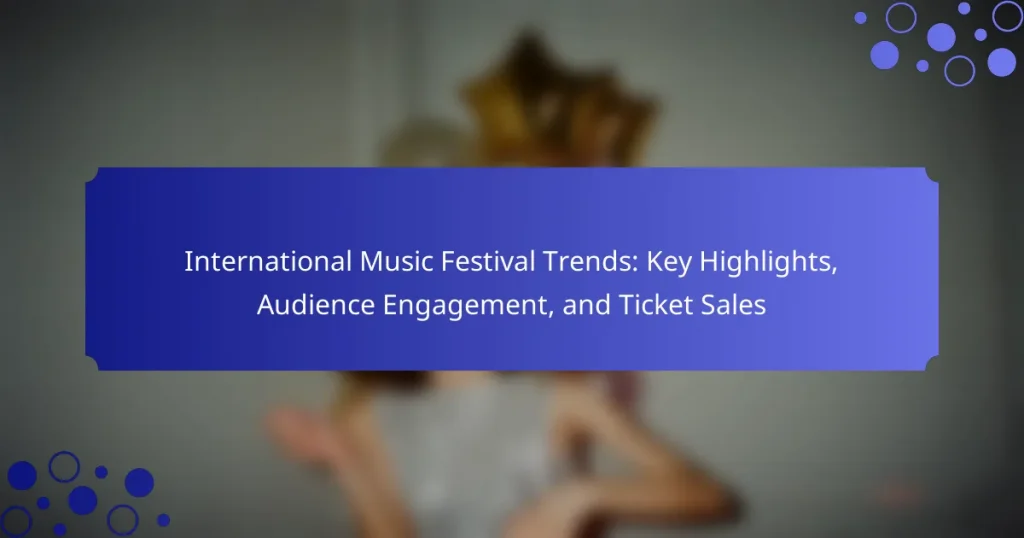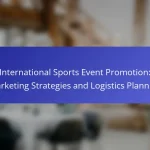The article examines current trends in international music festivals, highlighting key aspects such as sustainability, diverse lineups, and enhanced digital experiences. It discusses the implementation of eco-friendly practices, the popularity of varied musical genres and artists, and the rise of digital engagement methods like live streaming. Additionally, it presents data on ticket sales, revealing a significant increase in demand and the impact of innovative pricing strategies. The article also explores audience engagement approaches tailored to specific festival themes and demographics, illustrating how these strategies contribute to overall attendee satisfaction and festival success.
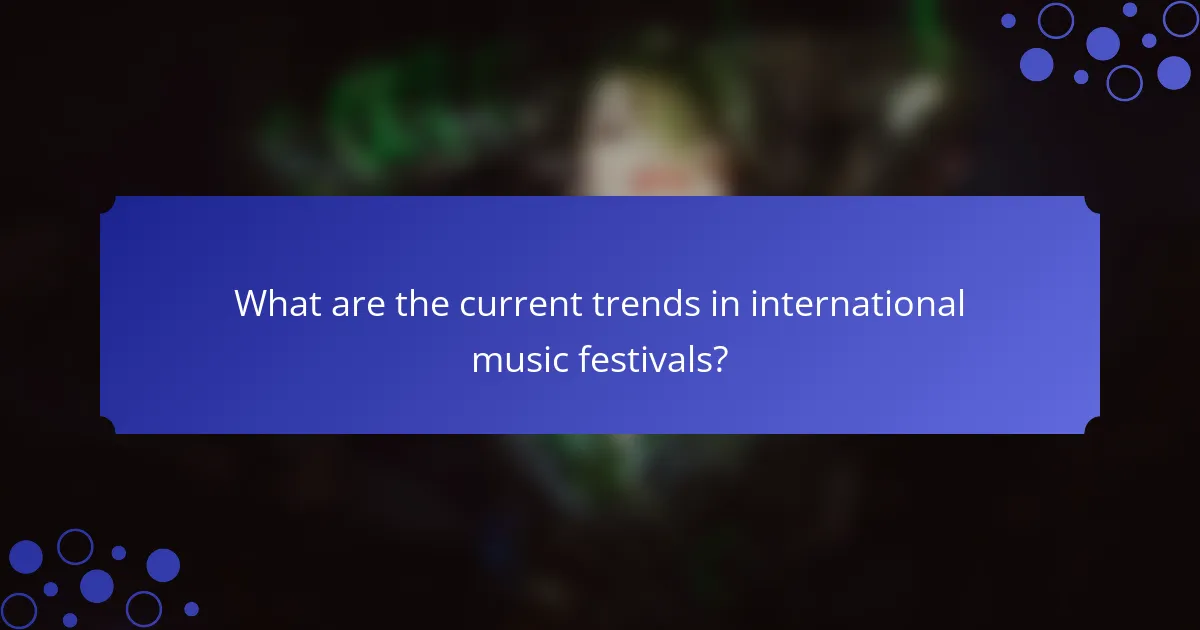
What are the current trends in international music festivals?
Current trends in international music festivals include a focus on sustainability, diverse lineups, and enhanced digital experiences. Many festivals are implementing eco-friendly practices to reduce their carbon footprint. This includes using renewable energy sources and promoting waste reduction. Diverse lineups are also gaining popularity, with festivals showcasing a wide range of genres and artists from various backgrounds. Enhanced digital experiences, such as live streaming and virtual reality, are providing access to wider audiences. Attendance at these festivals has been increasing, with reports indicating a 30% rise in ticket sales post-pandemic. Additionally, festivals are leveraging social media for audience engagement, driving ticket sales and community interaction.
How have international music festivals evolved in recent years?
International music festivals have evolved significantly in recent years. They have increasingly embraced technology to enhance audience engagement. Many festivals now utilize live streaming to reach global audiences. This adaptation has expanded their reach beyond physical attendees. Additionally, festivals are incorporating diverse genres to attract varied demographics. Sustainability has become a priority, with many events implementing eco-friendly practices. The use of social media for promotion and interaction has also surged. Ticket sales strategies have shifted to include tiered pricing and early-bird discounts. These changes reflect a dynamic response to audience preferences and market trends.
What technological advancements are shaping festival experiences?
Technological advancements shaping festival experiences include augmented reality (AR), mobile apps, and cashless payment systems. AR enhances attendee engagement by providing interactive experiences. Mobile apps streamline communication and offer real-time updates on schedules and lineups. Cashless payment systems increase transaction speed and reduce wait times. Drones are also utilized for aerial photography and crowd monitoring. Virtual reality (VR) offers immersive experiences for remote attendees. These technologies improve overall festival enjoyment and operational efficiency. According to a 2022 survey by Eventbrite, 67% of festival-goers prefer events that utilize technology for enhanced experiences.
How are cultural influences impacting festival line-ups?
Cultural influences significantly shape festival line-ups by determining the genres and artists featured. Festivals often reflect the cultural diversity of their locations. They prioritize local artists to promote regional music scenes. This approach fosters community engagement and supports emerging talent. Additionally, global trends impact programming decisions. Festivals may include popular international acts to attract wider audiences. The incorporation of cultural themes can enhance the festival experience. For example, festivals celebrating specific cultural heritage often showcase traditional music and performances. This strategy not only honors cultural roots but also educates attendees.
What are the key highlights of major international music festivals?
Major international music festivals feature diverse lineups, attracting global audiences. These festivals often showcase multiple genres, including rock, pop, electronic, and hip-hop. They provide unique experiences through immersive art installations and food vendors. Festivals like Coachella and Glastonbury also emphasize sustainability initiatives. Ticket sales for these events frequently reach sold-out statuses, indicating high demand. Additionally, many festivals offer live streaming options, expanding their reach to virtual audiences. Networking opportunities abound for artists and industry professionals at these events. Lastly, the economic impact is significant, with festivals generating millions in local revenue.
Which festivals are considered the most influential globally?
The most influential festivals globally include Coachella, Glastonbury, and Tomorrowland. Coachella, held in California, is known for its star-studded lineups and cultural impact. Glastonbury, in the UK, is famous for its size and diverse genres. Tomorrowland, based in Belgium, is a leading electronic dance music festival with a massive international following. These festivals shape music trends and attract millions of attendees each year. Their influence extends beyond music, impacting fashion, art, and social movements.
What unique features do these festivals offer to attendees?
International music festivals offer unique features such as diverse lineups, immersive experiences, and interactive installations. Attendees enjoy performances from various genres and cultures, showcasing global talent. Many festivals provide themed stages, enhancing the visual and auditory experience. Workshops and masterclasses allow attendees to learn from industry professionals. Exclusive meet-and-greet opportunities with artists create memorable interactions. Sustainable practices, like eco-friendly initiatives, attract environmentally conscious attendees. Unique culinary offerings often highlight local cuisine, enriching the festival experience. These features contribute to a vibrant atmosphere that engages and entertains attendees throughout the event.
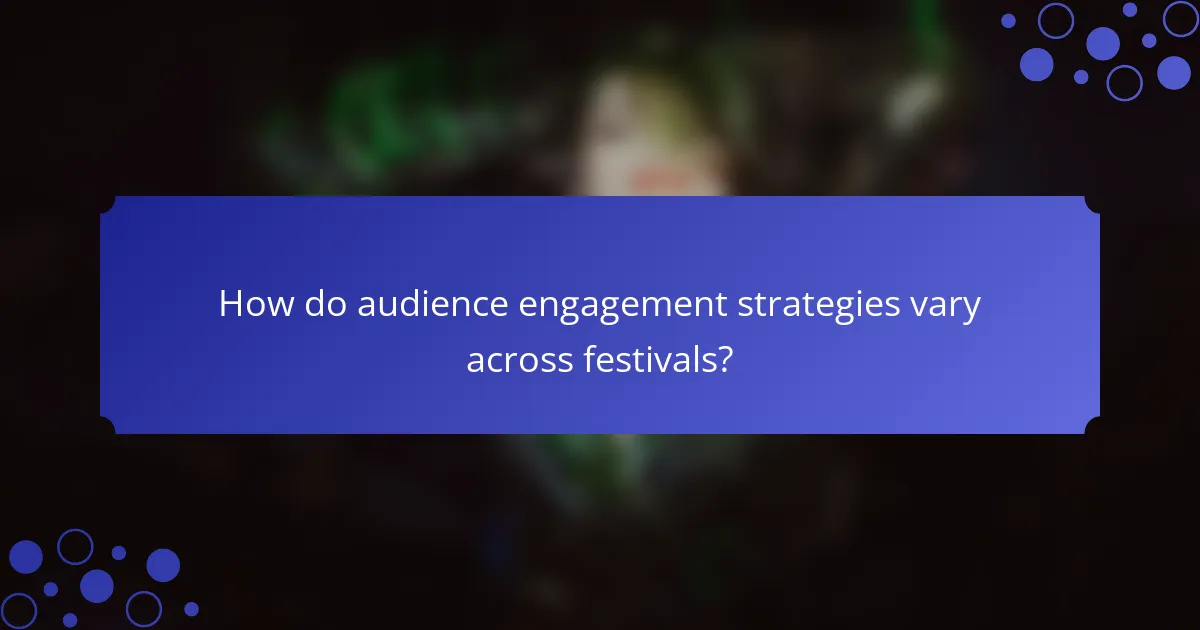
How do audience engagement strategies vary across festivals?
Audience engagement strategies vary across festivals based on their themes, target audiences, and cultural contexts. For instance, music festivals often utilize social media campaigns to connect with younger audiences. In contrast, cultural festivals may focus on community involvement and local partnerships. Interactive experiences, such as workshops and live performances, enhance engagement at many festivals. Festivals targeting families often include kid-friendly activities and educational programs. Data shows that festivals with diverse engagement strategies see higher attendee satisfaction. For example, the Coachella Music Festival employs influencer marketing to reach a broader audience. Festivals like the Edinburgh Festival Fringe prioritize audience participation through open submissions and performances. Each strategy aligns with the festival’s unique identity and goals.
What methods do festivals use to enhance audience participation?
Festivals enhance audience participation through interactive activities, social media engagement, and immersive experiences. Interactive activities include workshops, contests, and Q&A sessions that invite audience involvement. Social media engagement allows attendees to share their experiences in real-time, fostering a sense of community. Immersive experiences, such as art installations and virtual reality, create memorable interactions. These methods encourage attendees to feel more connected to the festival. Research shows that festivals incorporating these strategies see increased audience satisfaction and repeat attendance. For example, a study by Eventbrite found that 70% of festival-goers prefer events with interactive elements.
How do social media platforms play a role in audience engagement?
Social media platforms enhance audience engagement by facilitating direct communication and interaction. They allow artists and festival organizers to share real-time updates, fostering a sense of community. Users can comment, like, and share content, increasing visibility and participation. Platforms like Instagram and Facebook enable targeted advertising, reaching specific demographics effectively. According to a study by Sprout Social, 64% of consumers want brands to connect with them on social media. This connection leads to increased loyalty and attendance at events. Social media also provides a space for user-generated content, amplifying audience voices and experiences.
What interactive experiences are popular among festival-goers?
Popular interactive experiences among festival-goers include immersive art installations, live polling for setlists, and virtual reality zones. Immersive art installations engage attendees through sensory experiences and participation. Live polling allows audiences to influence performances in real-time, enhancing engagement. Virtual reality zones provide unique, interactive environments for attendees to explore. These experiences foster community and connection, making festivals more memorable. According to a 2022 survey by Eventbrite, 67% of festival-goers prefer events that offer interactive experiences. This statistic underscores the growing demand for engagement at music festivals.
Why is audience feedback important for festival organizers?
Audience feedback is crucial for festival organizers because it informs decision-making and enhances future events. Feedback helps organizers understand audience preferences and experiences. For instance, surveys can reveal which performances were most enjoyed. This data allows for better lineup choices in subsequent festivals. Additionally, audience feedback can highlight logistical issues, such as crowd management or amenities. Addressing these concerns can improve overall attendee satisfaction. Research indicates that festivals that actively seek and implement feedback see increased repeat attendance. Therefore, audience feedback directly contributes to the success and growth of music festivals.
How can festivals effectively gather and utilize audience feedback?
Festivals can effectively gather and utilize audience feedback by employing various methods. Surveys are a common tool for collecting structured feedback. They can be distributed online or in-person during the event. Social media platforms also provide real-time insights through comments and posts. Engaging with attendees through interactive sessions encourages open dialogue. Feedback kiosks at the venue offer immediate responses from participants. Analyzing ticket sales data can reveal preferences and satisfaction levels. Festivals should prioritize transparency in sharing how feedback influences future events. Research shows that 75% of attendees appreciate when their feedback leads to noticeable changes.
What impact does audience feedback have on future festival planning?
Audience feedback significantly influences future festival planning. It helps organizers understand attendee preferences and expectations. Feedback can reveal which artists or genres resonate most with the audience. This information guides lineup decisions for subsequent festivals. Additionally, feedback on logistics, such as venue accessibility and amenities, informs operational improvements. According to a 2021 survey by Eventbrite, 78% of festival-goers preferred events that adapt based on past attendee input. This demonstrates the importance of audience insights in enhancing overall festival experiences.
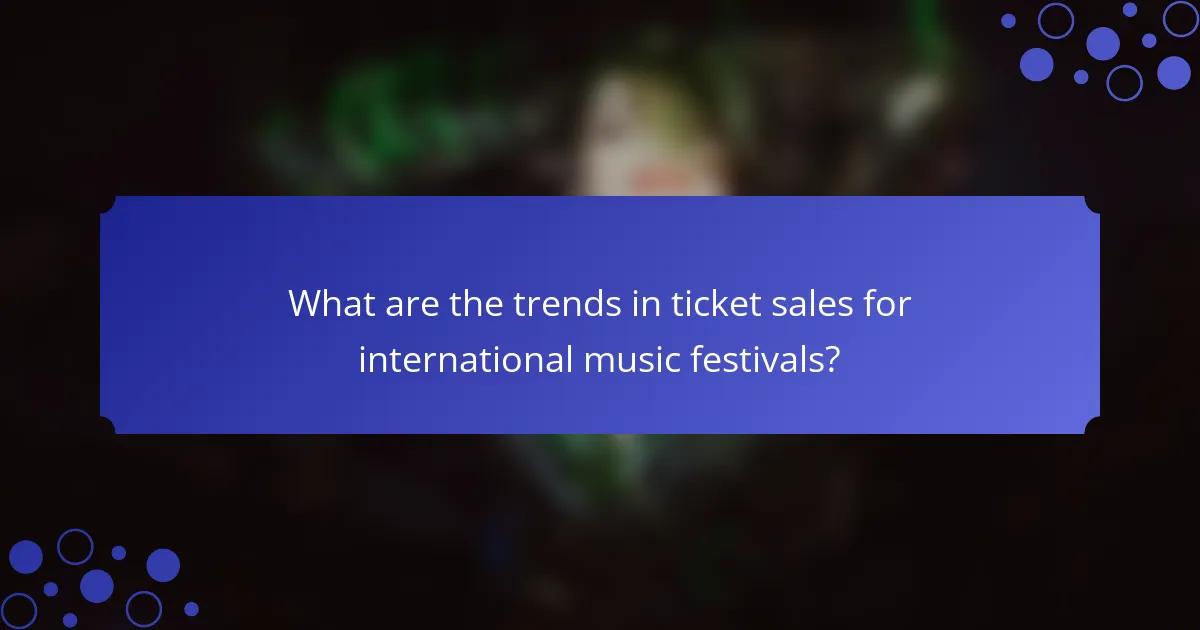
What are the trends in ticket sales for international music festivals?
Ticket sales for international music festivals have shown a significant increase in recent years. In 2022, global ticket sales reached approximately $25 billion, reflecting a recovery from pandemic-related declines. Festivals are experiencing higher demand, with many selling out months in advance. The rise of digital ticketing has streamlined the purchasing process, enhancing accessibility for fans. Additionally, tiered pricing strategies have emerged, allowing for various budget options. Data from Pollstar indicates that major festivals like Coachella and Glastonbury consistently sell over 90% of their tickets. The trend towards experiential offerings, such as VIP packages, has also contributed to increased sales. Overall, the international music festival market is expanding, driven by diverse lineups and enhanced fan experiences.
How have ticket sales changed in response to global events?
Ticket sales have fluctuated significantly in response to global events. For instance, during the COVID-19 pandemic, many festivals experienced a drastic decline in ticket sales due to restrictions. In 2020, the global live music industry lost approximately $30 billion. Conversely, as restrictions eased in 2021, ticket sales rebounded sharply. Major festivals reported selling out quickly as audiences sought to return to live events. The impact of global events has also led to increased demand for virtual ticket options, broadening audience reach. Overall, ticket sales are closely tied to the prevailing global climate and public sentiment.
What pricing strategies are being adopted by festival organizers?
Festival organizers are adopting tiered pricing strategies. This approach involves setting different price levels for various ticket types. Early bird tickets are often offered at a lower price to incentivize advance purchases. VIP packages are also common, providing exclusive access at a premium cost. Group discounts encourage larger purchases by reducing the per-ticket price. Dynamic pricing is increasingly used, adjusting costs based on demand and sales timing. Additionally, some festivals implement payment plans to make attendance more affordable. These strategies aim to maximize revenue while enhancing audience engagement.
How are early bird and tiered ticket sales influencing attendance?
Early bird and tiered ticket sales significantly influence attendance at events. Early bird tickets incentivize attendees to purchase tickets sooner, often resulting in higher initial sales. This strategy creates a sense of urgency and boosts early revenue. Tiered ticket sales offer varying price points, appealing to different audience segments. This approach allows more attendees to participate based on their budget. Research shows that events with early bird pricing can see attendance increases of up to 30%. Additionally, tiered pricing can enhance perceived value, encouraging attendees to opt for higher-priced packages that include added benefits. Overall, these sales strategies effectively drive higher attendance figures at music festivals.
What factors contribute to the success of ticket sales?
Effective marketing strategies contribute significantly to the success of ticket sales. Targeted advertising reaches potential attendees through social media and traditional media outlets. Early bird pricing incentivizes purchases, creating urgency among buyers. Engaging artists and performers attract larger audiences, enhancing ticket appeal. Venue location and accessibility play a crucial role in attendance rates. Additionally, partnerships with local businesses can boost visibility and sales. Historical data shows that festivals with strong community involvement often experience higher ticket sales.
How does marketing play a role in boosting ticket sales?
Marketing significantly boosts ticket sales by creating awareness and generating interest. Effective marketing strategies target specific audiences through various channels. Social media campaigns engage potential attendees and encourage sharing. Email marketing provides personalized offers to loyal customers. Promotions and discounts can incentivize early purchases. Collaborations with influencers expand reach and credibility. Data-driven marketing helps identify trends and preferences. According to a study by Eventbrite, festivals that utilized targeted marketing saw a 30% increase in ticket sales.
What partnerships can enhance ticket sales for festivals?
Strategic partnerships can significantly enhance ticket sales for festivals. Collaborating with local businesses can create mutual promotional opportunities. For instance, partnerships with hotels can offer package deals to festival-goers. Collaborating with transportation services can facilitate easier access to the event. Sponsorships from brands relevant to the festival audience can increase visibility. Social media influencers can amplify marketing efforts through their platforms. Collaborating with artists for exclusive content can attract more attendees. Research indicates that festivals with strong partnerships see a 20% increase in ticket sales.
What best practices can festivals adopt to improve ticket sales?
Festivals can improve ticket sales by implementing targeted marketing strategies. Utilizing social media advertising can reach specific demographics effectively. Offering early bird discounts incentivizes early purchases, boosting initial sales. Collaborating with influencers helps enhance visibility and credibility. Creating engaging content around the festival increases audience interest and shares. Streamlining the ticket purchasing process reduces friction and cart abandonment. Providing tiered pricing options can appeal to a broader audience. Lastly, leveraging data analytics helps festivals understand consumer behavior and preferences.
The main entity of the article is international music festivals. This article provides an overview of current trends in international music festivals, highlighting the focus on sustainability, diverse lineups, and technological advancements that enhance audience engagement. It explores how festivals have evolved, the impact of cultural influences on line-ups, and the significance of audience feedback in shaping future events. Additionally, the article examines ticket sales trends, pricing strategies, and marketing practices that contribute to the success of these festivals, offering insights into the dynamic landscape of the music festival industry.
